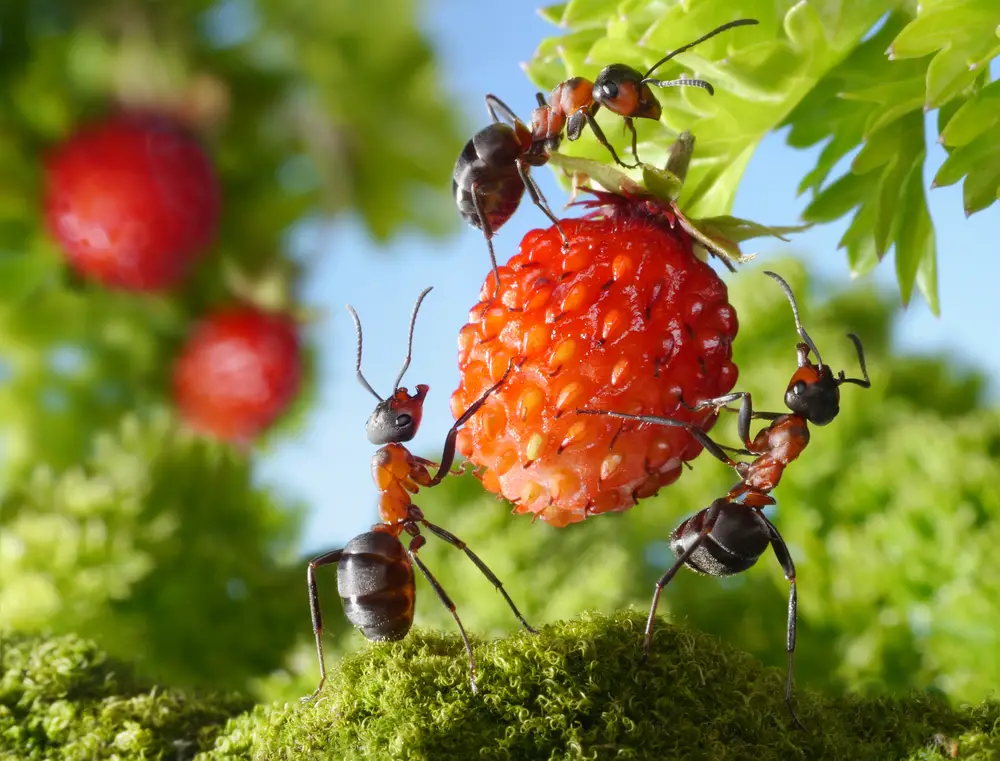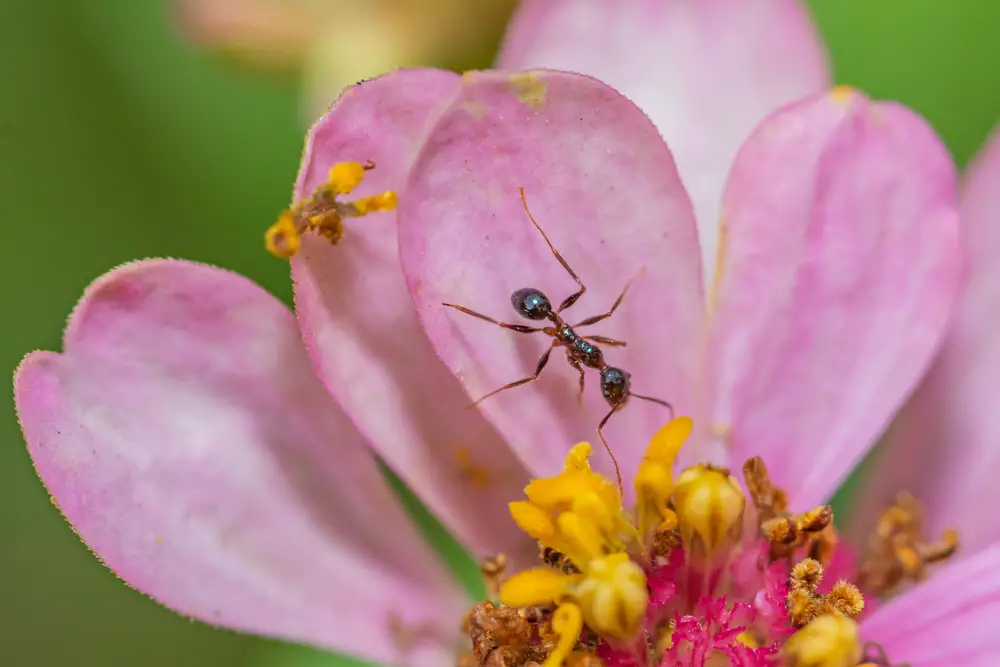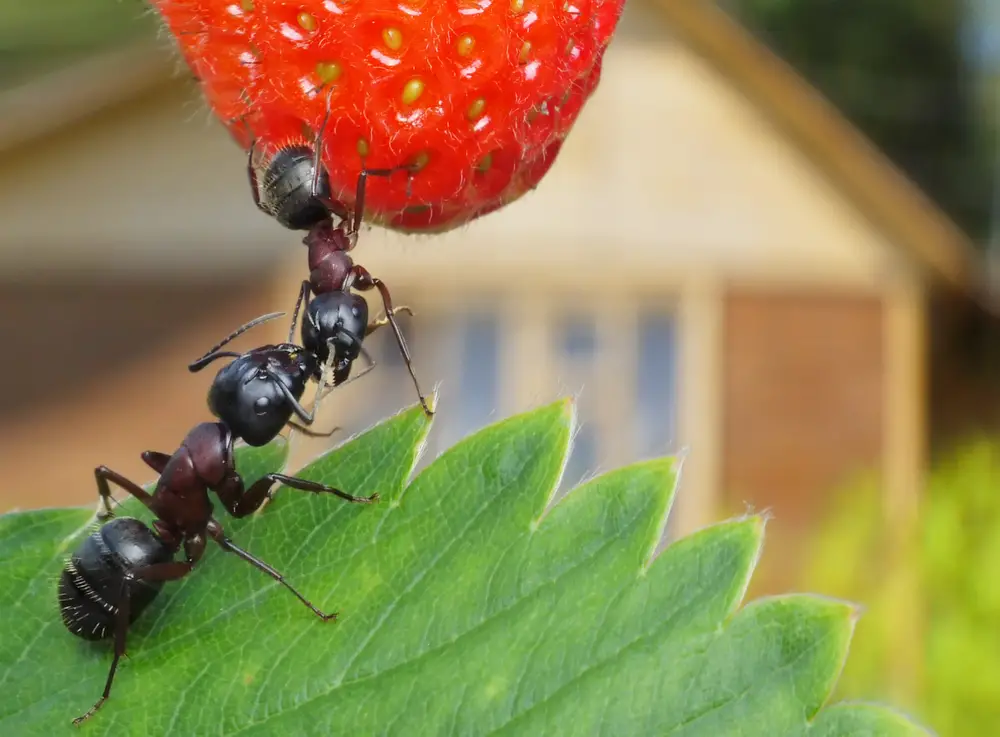If you want to know how to get rid of ants in the garden, this article’s got you covered!

Ants are among the most common types of insects on the planet, and despite not being as disgusting as other pests, their extremely social habits mean they can cause an infestation pretty easily. However, ants aren’t all that bad, as they play a significant role in the ecosystem in your garden, but when things get out of control, you must take matters into your own hands.
In today’s guide, we’ll walk you through some of the tried and true methods that are proven to work in the case of an ant infestation.
So without further ado, let’s dive right in!
Table of Contents
When Should You Get Rid of Ants in Your Garden?

In most cases, having a few ants here and there shouldn’t be a problem for your garden. In many cases, ants are actually good for a garden, especially if you grow plants.
The Advantages of Having Ants in the Garden
Ants, like other insects, help in the transportation of pollen, which improves the rate of pollination in plants and helps in improving the yield.
The way ants build tunnels also helps in supplying the soil with oxygen and facilitates the watering of the deep soil when it rains.
Additionally, according to studies, ants will deter other insects and pests from their territory, and farmers have been using them for that purpose for thousands of years!
The Disadvantage of Having Ants in the Garden
On the other hand, ants can also become a nuisance when they increase exponentially in numbers.
Since aphids produce honeydew that ants consume, they’ll protect these species, which may help them thrive around your garden.
Also, if your garden is too close to your house, ants may start to show up indoors, which can cause damage to the house structure as well as appliances with time.
Moreover, ants exist in thousands of species, and not all of them are harmless. Some ants may bite or sting, such as carpenter ants and fire ants.
In that case, you’ll need to find some solutions to remove ants from your garden before they advance into a bigger problem.
13 Methods and Tips to Get Rid of Ants in Your Garden
Now that you know the pros and cons of having ants in the garden, let’s take a brief look at some of the methods and tricks that a lot of gardeners found helpful in removing ant colonies from their property.
Keep in mind that ants are pretty persistent and you may need to use a combination of these methods to get rid of them.
1. Drown Their Colony in Boiling Water
The first step to getting rid of ants is to find where they live. Ants will typically live in a large underground colony.
This gives you a chance to get rid of most of the ants at once. It’ll also push them to find a safer spot to rebuild their colony away from your garden.
To find the colony, follow the ant trail until you find a mound with an entrance at the top (like a mini volcano).
After you find as many of these entrances as possible, pour some boiling water down these colonies to kill the ants inside.
2. Get Rid of the Reason They’re Around
Ants are known for their ability to cultivate aphids, scales, whiteflies, mealybugs, and other insects that produce sticky honeydew.
If you have lots of these pests around your garden, pushing them away with commercial pesticides should encourage the ants to move out to another spot where they can find them.
3. Release Their Predator
Ringworms and other nematodes are natural predators of ants, and they’re known to deter ants away looking for a safer spot to build their colony.
Despite being a surefire method, things can go out of hand, and you might end up with a nematode infestation. This requires sterilizing your soil or removing them manually, which can be a headache.
4. Try Diatomaceous Earth (Ideal for Pet Owners)
- Natural Product - Composed of 10lbs of 100% ground freshwater diatomaceous earth with absolutely no additives or fillers.
- OMRI Listed - Listed with the Organic Minerals Research Institute, a non-profit organization that reviews products against organic standards.
- Powder Duster Included - Powder duster in the bag for easy and efficient application in difficult to reach areas.
- Made in the USA – Mined in Nevada and packaged in Georgia
- Supports a Great Cause - Harris donates a portion of profits to support the local Etowah Valley Humane Society.
Last update on 2025-03-27 / Affiliate links / Images from Amazon Product Advertising API
Diatomaceous earth (DE) is a powder made of microscopic fossilized diatoms. Luckily, food-grade DE is an excellent way to kill a variety of critters, such as ants and roaches, all the while not being toxic to pets.
To use the DE properly, make sure that you sprinkle the powder on a dry part of the ant’s trail and give it some time. Ants will typically start dying in the following days.
5. Add Water and Vinegar
If the colony is pretty far from your garden, you can try out this method, as vinegar will dramatically alter the pH of your soil.
Add equal parts of water and pure white vinegar in a bottle, then add one or two drops of dish soap to the mix.
Find the entrance to the colony and pour the mix down through the entrance. Although some people recommend raking out the colony first, leaving the colony intact at the beginning will help the mix reach more ants quickly.
6. Use Borax Traps
Boric acid and borax are indigestible and quite toxic for ants. A good way to kill the ants around your garden is to set a borax trap.
Mix borax or boric acid with sugary jelly to attract ants. After taking it to the colony to feast on it, all the ants will start dying from the toxic borax.
7. Try the Tobacco Water Method
Soak some organic pipe tobacco in water for 6 to 8 hours, then pour the mix directly on the colony.
This should give the ants a lethal dose of the tobacco’s active ingredient, nicotine, which is extremely toxic for ants, and used as a natural insecticide.
8. Consider Using Talcum Powder (Baby Powder)
For the same reason Talcum powder is used for babies, it can be an excellent solution to ants.
Baby powder is an excellent drying agent, which means that it’ll draw the moisture out of the ant’s body and eventually kill it. Sprinkling some of the powder over the colony should do the trick.
9. Replace Ant Poison with Ant Killing Gels
- Helps get rid of ants in just 3 to 5 days
- Best used in cracks and crevices where ants enter the home
- Eliminates the entire ant colony
- Fipronil, one of the most powerful ant killers, starts to exterminate ants in hours
- This package contains one 0.95 ounce syringe of Combat Max Ant Killing Gel
Last update on 2025-03-27 / Affiliate links / Images from Amazon Product Advertising API
Avoid using commercial ant poisons around your garden because they’re quite toxic and may disrupt vegetation.
If you want a quick commercial solution rather than a DIY remedy, you should consider ant-killing gels. These products are typically an enhanced version of the borax trap, which isn’t dangerous for plants.
10. Spray Some Castile Soap on the Ants
Castile soap has a deterring peppermint odor and will kill the ants almost instantly. Dilute the liquid soap in some water with a ratio of 1:4, and use it as a spray to kill the ants.
This spray bottle should be close by to kill any stray ants that are scouting around the garden. The powerful peppermint scent of the soap will mask the smell of formic acid that attracts live insects to dead ones.
11. Sprinkle Lemon Peel Powder
When you’re done using citrus fruits, and especially lemons, don’t throw them away. Instead, let them dry up in the sun and crush them into a fine powder.
After that, you can sprinkle the powder around your garden. Insects are deterred from citrus scents, so the powder should keep them out of the garden.
12. Add a Few Drop of Essential Oil Around the Garden
Similar to citrus fruits, other fragrant plant-based essential oils will also keep ants at bay. To apply this method, you’ll only need to sprinkle a few drops of essential oil around the garden.
In addition to deterring insects, this will make your garden’s scent more refreshing. Additionally, if you don’t know what to grow in your little garden, you can grow some of the aromatic plants that give off a lovely scent, and also doubles as an excellent insect repellant.
These include:
- Lavender
- Rosemary
- Mint
- Thyme
- Peppermint
13. Seek Professional Help
Last but not least, if all of these methods fail to solve your ant problem, or you’re looking for a quick and easy method to completely eradicate the ants invading your garden, there’s no shame in leaving the job to a professional.
Exterminators are extremely experienced and know all the best ways to solve ant infestation problems from its roots.
The only drawback to opting for exterminators is that may come at a significantly higher price, which can go as high as $500, especially in the case of fire and carpenter ants.
Final Thoughts

This wraps it up for today’s guide on how to get rid of ants in the garden. As you can see, when moderately present, ants can actually be good for your garden. They’re a natural pest control method and they help in improving the pollination rates in the garden.
However, if they reach the point of infestation and start building large colonies, following some of these methods should help you solve this problem for good!

